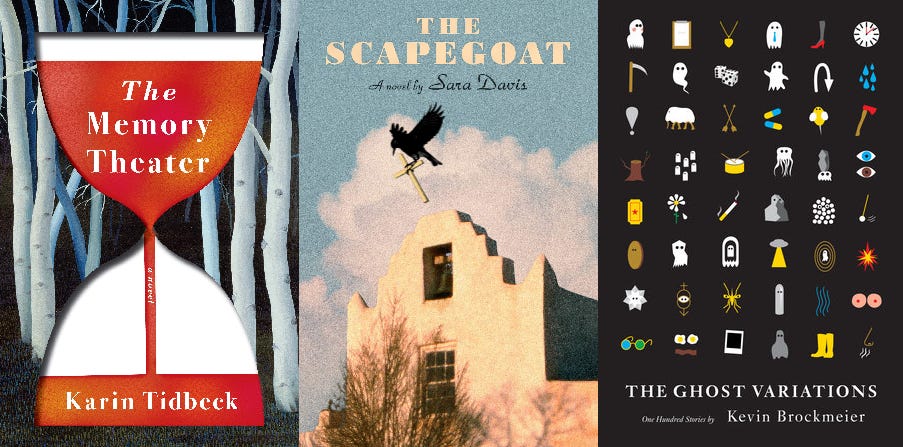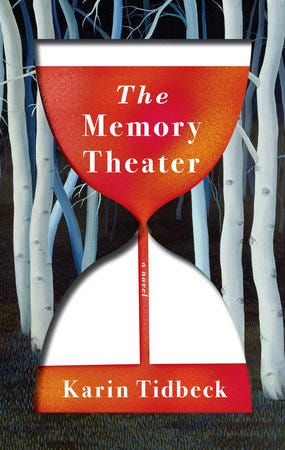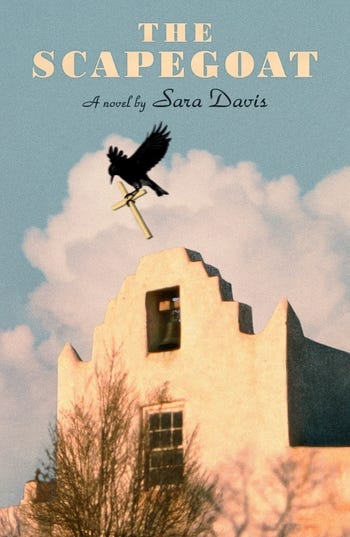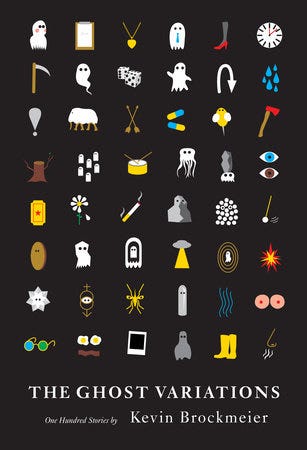If you casually follow the literary world, it can feel like there are only two or three books published at a time. Conversation tends to be monopolized by just a handful of titles, which creates its own feedback loop: the more a book is talked about, the more people are interested , the more they click on links, the more websites are incentivized to do even more coverage. Obviously lots of deserving books get that kind of coverage (and lots of undeserving ones too), but there are countless other books published every month. So I thought I might start a regular feature here of books I enjoyed that I haven’t seen as much coverage of.
I’ll start with three books I devoured the first three months of the year: The Memory Theater, The Scapegoat, and The Ghost Variations. All three of these books—perhaps unsurprisingly for those of you reading my newsletter—are weird, genre-bending books by excellent prose stylists.
First up is The Memory Theater by Karin Tidbeck. Tidbeck is one of my favorite living authors of what a few decades ago would be called “slipstream fiction” but I suppose now would just be called “weird fiction” or just generally “speculative.” Perhaps another way to put it is their work is just impossible to pin down, genre wise. Tidbeck’s last novel, Amatka, takes place in a strange isolated mushroom-farming village that is possibly on another planet where language can literally transform matter. It’s a bit science fiction, a bit fantasy, a bit dystopia, and a bit Kafkaesque nightmare. Tidbeck’s story collection Jagannath—my favorite of theirs—is all over the place genre wise too. The Memory Theater, released this February, is perhaps a bit easier to label as a fabulist work…although plenty of other modes come into play including science fiction concepts and lots of bloody horror. It involves a mystical garden where immortal aristocrats daily slaughter their servants for fun, until two of them escape through the multiverse. Imagine a macabre Alice in Wonderland written in spare and sharp prose.
I interviewed Tidbeck for BOMB magazine when the book came out, and on the topic of genre labels they said, “I don’t care about genre when writing. The story is what it is; someone else can label it whatever they like. I don’t have a particular affinity to any of the genres. I just do what feels right.”
The Scapegoat is a slim, fast-paced, and elliptical debut novel from Sara Davis. Genre wise this is a noir mixed with an academic novel. Mood wise, I’d call it Lynchian in that there’s a foreboding since of dread running through everything, even the most banal interactions, yet it’s also full of humor. (Often when people call something “Lynchian” they just seem to mean weird and terrifying but humor is essential to Lynch’s work imho.) I laughed out loud several times while reading this. As it’s a noir, there’s plenty of plot and I don’t want to spoil it here. But if a creepy little fever dream of a noir sounds up your alley, give this one a read.
Lastly (in pub date chronology) is Kevin Brockmeier’s The Ghost Variations. As the subtitle says this is "one hundred stories” that are, yes, about ghosts. Every kind of ghost imaginable. Philosophical ghosts, animal ghosts, trolling ghosts, people-who-are-about-to-be-ghosts, and more. These one hundred flash fictions run the gamut from horror to fabulism to everything in between. (Overall the vibe is closer to Italo Calvino than Clive Barker.) I was lucky enough to get to publish one these stories in the horror flash fiction anthology I co-edited, Tiny Nightmares (which I obviously recommend if you like flash horror!), so I knew I’d enjoy the book. But I’m loving it even more than I expected. It’s exactly the kind of book I love in that it’s endlessly inventive and thus gives me endless ideas in my own work.
While I don’t know Brockmeier’s writing process, this book strikes me as one written with the “invisible architecture” and also fits into my post about the craziest ideas making the most brilliant books. If you like ghosts and fabulism, I’m pretty sure you’ll love this.
That’s it for now. I’m planning to keep most of this newsletter free, but I’m going to start making some of the craft-focused articles for subscribers only. So if you want to get a cheap version of an MFA in your inbox (pretty literally, since many of these posts are drawn from lectures I give in class) consider subscribing?







